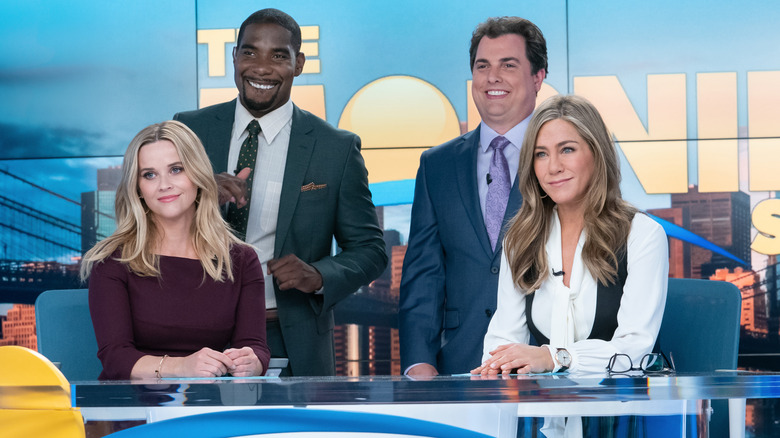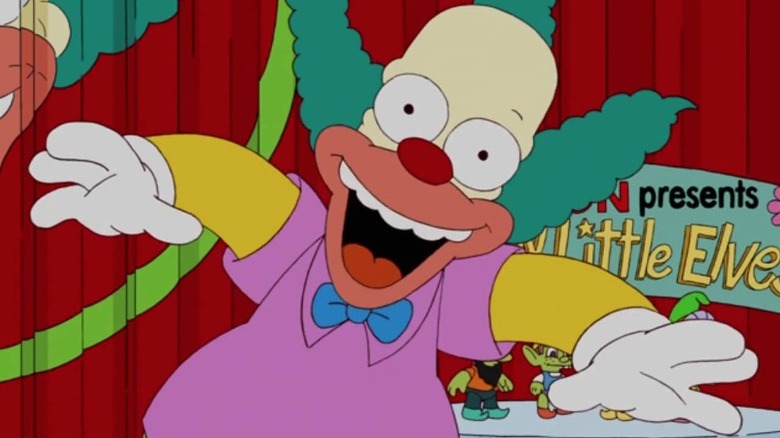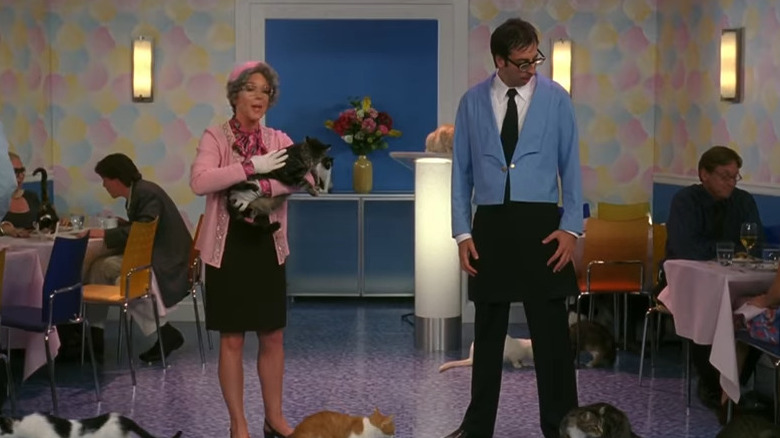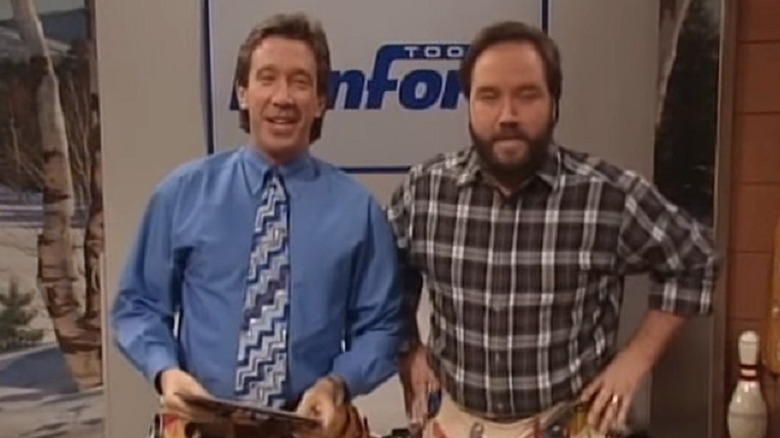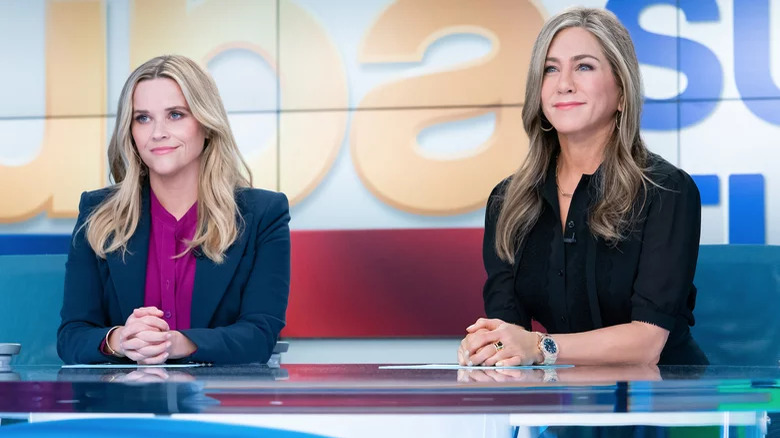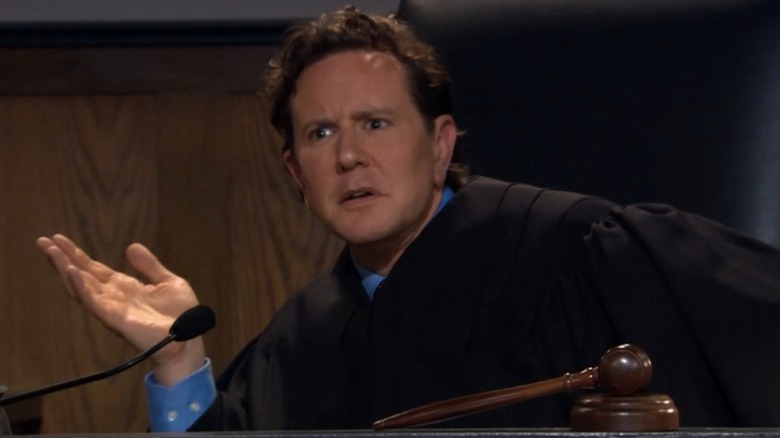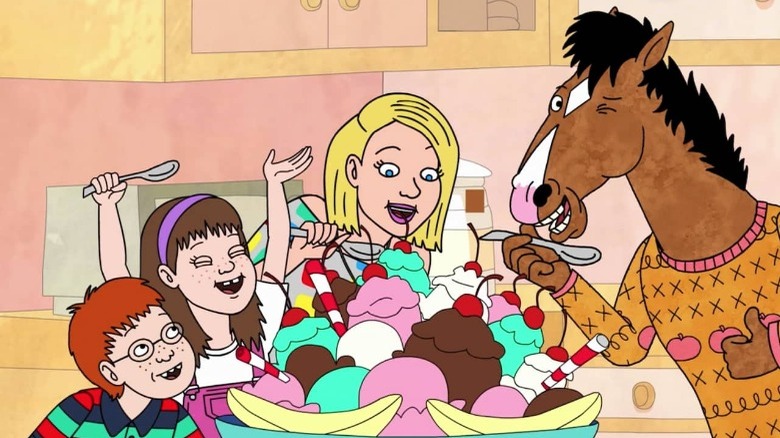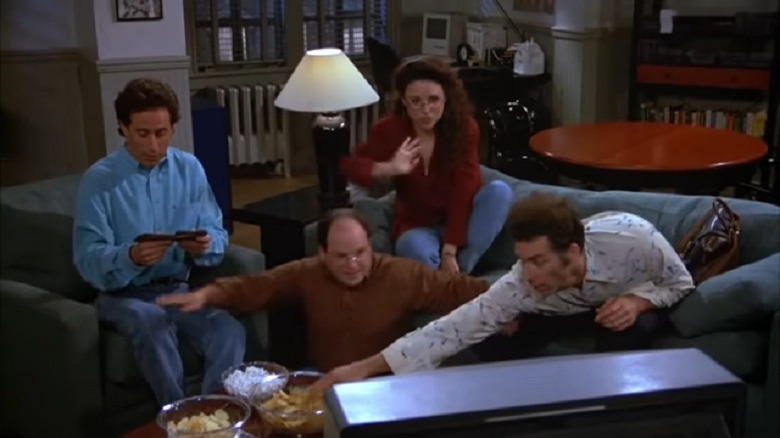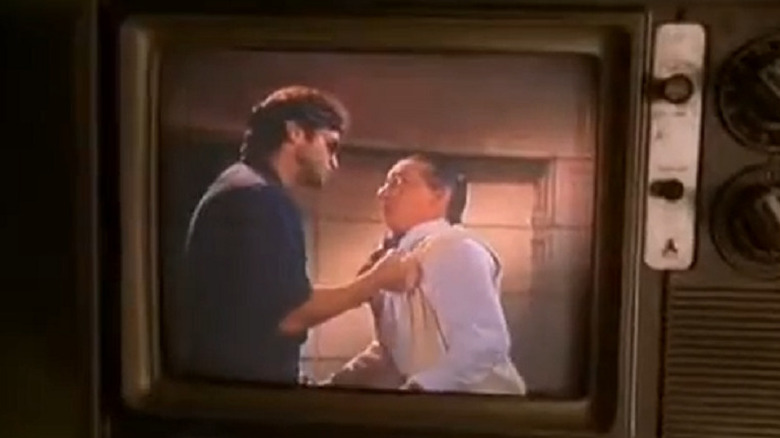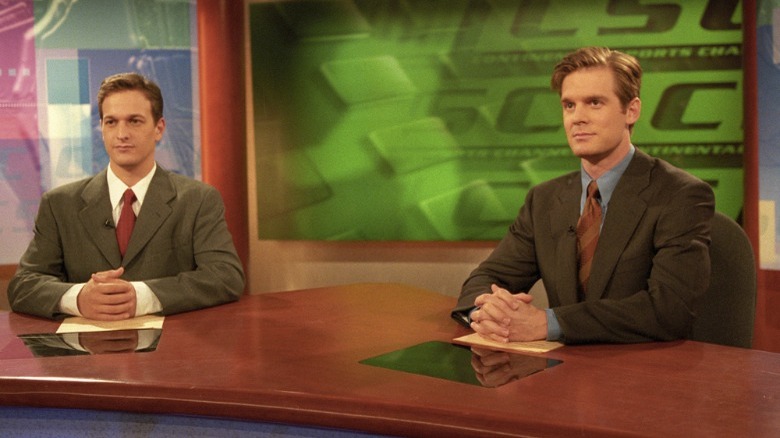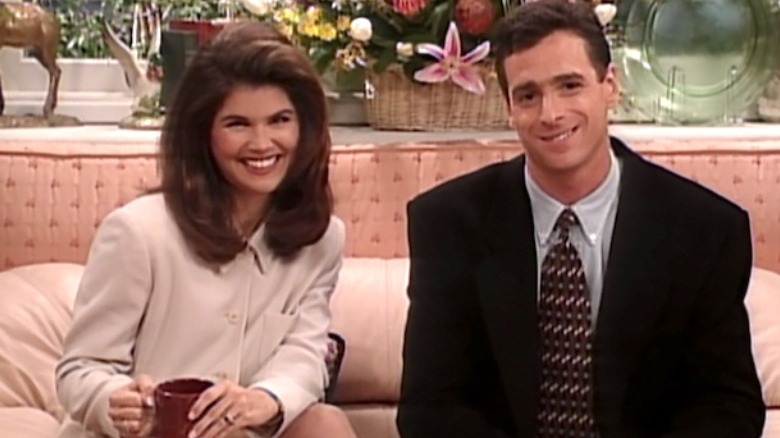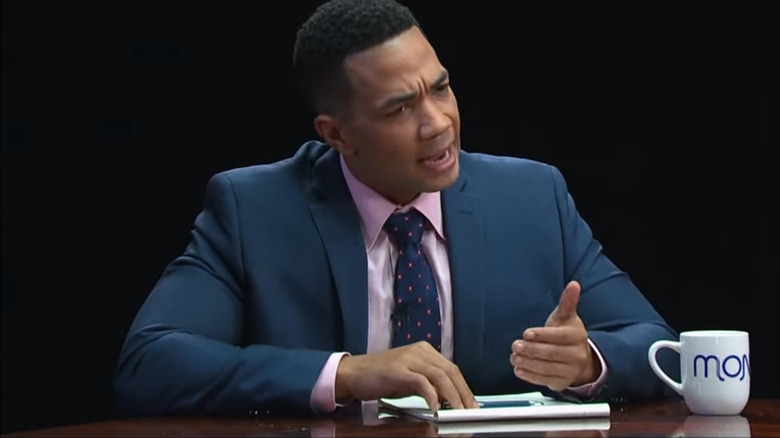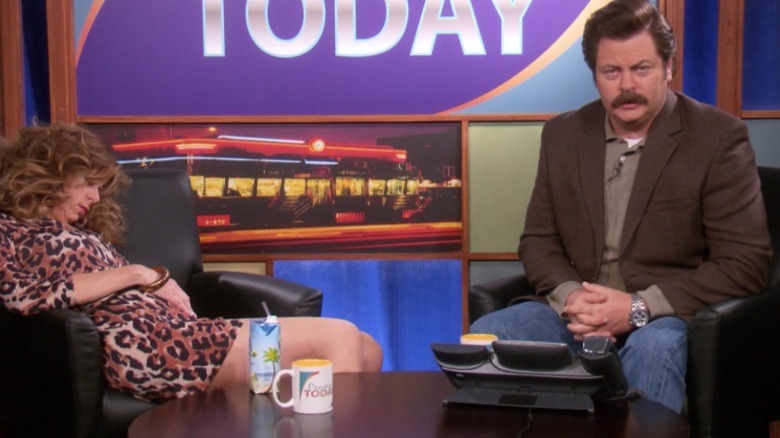Fake Shows We Wish We Could Watch For Real
Stories within stories span almost every medium, with plenty of films, TV shows, plays, and books featuring self-referential or meta moments. Everything from William Shakespeare's "Hamlet" to the 1952 movie "Singin' in the Rain" features a play within a play or a movie within a movie, and audiences may just find themselves wishing that they could experience these fictional stories for real.
Television is perhaps the medium where we see this the most. TV is made to appeal to the everyday citizen, to reflect us back to ourselves, and what better way to do this than to make TV shows about TV shows? Even early sitcoms like "I Love Lucy," "The Dick Van Dyke Show," or "The Mary Tyler Moore Show," are all about characters adjacent to the entertainment industry themselves. In the last half-century, creating fake shows that fictional characters watch has allowed many shows — particularly sitcoms — to execute hilarious gags about their own business, and to give us a sense that our TV heroes live in a world as chaotic and media-saturated as our own. These are the best fake shows that we wish we could watch for real.
The Krusty the Clown Show from The Simpsons
Holding the record as the longest-running American animated series and the longest-running American sitcom, "The Simpsons" began as a show within a show itself. For three years before it premiered as a half-hour show on Fox, it was a series of animated short segments on the sketch-comedy series, "The Tracey Ullman Show." In fact, the second-ever appearance of the Simpson family is a short entitled "Watching Television," mocking the idea that watching television brings families together. Ironically, what began as a pointed satire of the American television-watching public has become a TV institution of its own.
The Simpson family have remained avid TV watchers, and an almost constant fixture of the household is "The Krusty the Clown Show." The show is a send-up of the famously long-running character Bozo the Clown, who was franchised to several markets nationwide during the '50s and '60s. Like many of the kids' variety shows it parodied, "The Krusty the Clown Show" featured animated segments of its own — most famously "The Itchy & Scratchy" show which is itself a homage to the slapstick antics of "Tom & Jerry." With the enigmatic Krusty at the center, and a wealth of off-color jokes that are definitely not for kids, "The Krusty the Clown Show" is one that would feel right at home in the real world.
TGS with Tracy Jordan from 30 Rock
You could almost fill an entire list just with the fake shows from "30 Rock" — Tina Fey's no-holds-barred satire of showbiz. The many fictional dramas, game shows, and movies that its characters took part in were intentionally over the top, but in the years since the show wrapped up, reality seems to have risen to the challenge. Whenever a movie with a preposterous title comes out, the common refrain of "that sounds like a '30 Rock' joke" will often pop up on social media. From the "Survivor" parody "MILF Island," to the impossible-to-win gameshow "Homonym," the fake shows on "30 Rock" provided some of the most indelible gags.
But the best of them all is the main show within the show, the loose parody of "Saturday Night Live" titled "The Girlie Show" and later renamed as "TGS with Tracy Jordan." With many of the cast members of "30 Rock" being SNL alumni, the satire is absolutely pitch-perfect and gloriously dumb. Featuring recurring bits like "Robot/Bear talk show" and "Fart Doctor," "TGS with Tracy Jordan" consistently blurs the line between parody and reality in hilarious fashion.
Tool Time from Home Improvement
Television hosts are usually impeccably calm, collected, and professional: Giada De Laurentiis never drops food on her beautiful clothes, Alex Trebek always had the answers, and Bob Vila never horrifically injured himself while attempting repairs on "This Old House." Fortunately, the 90s sitcom "Home Improvement" imagined that last one for us on a regular basis, in the form of Tim Taylor's (Tim Allen) show "Tool Time." Tim Taylor was essentially an over-confident, dumber version of Vila that caused chaos in every "Tool Time" episode we were shown.
Usually — in spite of the level-headed advice of his cohost Al Borland (Richard Karn) — Tim would bring out his own personal version of various machinery that he had rewired for "more power," and disastrous consequences would ensue. Thankfully, like a cross between a real person and a cartoon character, Tim would bounce back unharmed every time. "Tool Time" sponsor Binford Tools must have done some incredible liability work in the fictional Tim's contract, because "Tool Time" ran for the entirety of the eight years that passed in the world of "Home Improvement."
The Morning Show from The Morning Show
Morning TV shows — the kind of light news "infotainment" also known as "breakfast television" — are often pretty run-of-the-mill affairs. Apple TV+ wanted to change that perception with "The Morning Show," a behind-the-scenes look at a fictional clone of "Today" or "Good Morning America," based on the book "Top of the Morning: Inside the Cutthroat World of Morning TV" by Brian Stelter. Unlike its real-world counterparts, watching "The Morning Show" itself — that is, the show within the show of the same name — is endlessly entertaining.
"The Morning Show" details a host of dramatic, ridiculous, and shocking on-air incidents, including brand new co-host Bradley (Reese Witherspoon) accidentally letting slip about her teenage abortion and anchor Alex (Jennifer Aniston) having a sobbing emotional breakdown while holding a puppy. Covering real-world topics including the "#MeToo" movement and the Covid-19 pandemic in its own unique way ensures "The Morning Show" is always holding a lens up to the real shows it is sending up, while also providing its unique blend of drama and entertainment.
Mock Trial with J. Reinhold from Arrested Development
Technically the episode we see of "Mock Trial with J. Reinhold," in the standout episode "Fakin' It" from the third season of "Arrested Development," is an unaired rehearsal in order for the Bluth family and Judge Reinhold (playing himself) to get some much-needed practice. But it's enough of a glimpse to be crestfallen that it's not a real show, as it would put even the wackiest installments of "Judge Judy" to shame.
Even though mock trials are apparently admissible evidence in the California court system of "Arrested Development," Judge Reinhold's courtroom was pretty lax. Puppets are allowed to testify, and sons with hazy childhood memories of prosecuting Captain Hook can serve as lawyers. Plus how many court TV shows feature their own house band? "Mock Trial" features the pun-based band "William Hung and the Hung Jury," capitalizing on a pop culture phenom that bombed on "American Idol." In a fun twist, William Hung told LA Weekly that he now has a career in law-adjacent work as an analyst for the Los Angeles County Sheriff's Department.
Horsin' Around from BoJack Horseman
BoJack Horseman (Will Arnett) — the eponymous subject of the animated Netflix about a cartoon horse — appears in a few different shows within the show. "BoJack Horseman" followed its protagonist as he appeared on the hilariously-titled quiz show "Hollywoo Stars and Celebrities: What Do They Know? Do They Know Things? Let's Find Out!" and reclaimed mainstreamed TV stardom as the lead on the gritty detective show "Philbert." But the show we most want to see is the one that launched BoJack to fame in the '90s, "Horsin' Around."
A pitch-perfect parody of family programming like "Full House," BoJack played "The Horse" that adopts three orphans on a multi-camera sitcom complete with a studio audience. Even though we learn that there were tragic secrets and betrayals behind the scenes of the show, "Horsin' Around" still represents the ideal comfort watch that television can offer, and re-watching old episodes of himself gets BoJack through hard times decades later. In a hilarious reference to the ending of "Dinosaurs," "Horsin' Around" ends on the surprisingly somber note of The Horse dying of a broken heart because the children didn't appreciate him enough. Much like "BoJack Horseman" itself, it is bleak and hilarious. While the glimpses of "Horsin' Around" are always enjoyable, we can't help but wish it were real.
Jerry from Seinfeld
For a recurring arc through Season 4 of "Seinfeld," the famous "show about nothing" became a show about itself. Starting with the third episode "The Pitch" and culminating in the two-part finale "The Pilot," the show would depict Jerry Seinfeld (Jerry Seinfeld) and George Costanza (Jason Alexander) going through a version of the same process that the real Jerry and "Seinfeld" co-creator Larry David went through to pitch the show to NBC. As the popularity of the Twitch phenomenon "Nothing, Forever" proves, people are down to watch anything that even remotely resembles "Seinfeld," so it's a pity that "Jerry" — the show within the show — didn't get picked up.
Fortunately "Seinfeld" let us get a fictional look at how the show came together. From the initial conversation about how the show should be about inane, everyday conversations, all the way through the casting, the process of "Jerry" let us replicate the mind-bending sensation the real Seinfeld must have gone through in turning his life routine into a show. Cruelly, the finale of "Seinfeld" raised the possibility of "Jerry" being picked up by a new network head, only for the main characters' prison sentence to get in the way.
Invitation to Love from Twin Peaks
We supposedly live in a "new golden age" of television, one that theoretically started with 1999's "The Sopranos." But an overlooked stepping stone to get to the current era of auteur-driven, prestige, and experimental dramas is how the original run of "Twin Peaks" changed TV. David Lynch's strange, oftentimes hilarious murder mystery was like nothing else on the air in 1990. It played on our expectations of narrative, and even used a show within the show — the soap opera "Invitation to Love" — to comment on the surreal experience of television watching itself.
Shot on video, with a much smaller cast than most soap operas, "Invitation To Love" was a staple on the background TVs in the fictional sleepy town of Twin Peaks, Washington. The histrionics and absurd developments in "Invitation to Love" mostly involve the rights to a high-rise apartment complex called "The Towers," and it served as the perfect comedic counterpoint to the more muted, somber tone of "Twin Peaks" itself. One of the most memorable moments sees Leo (Eric Da Re) sitting down to watch an "Invitation to Love" character get shot — having just been shot himself — which perfectly captures the absurdity of the show.
Sports Night from Sports Night
Before he would go on to write much more serious, important dramas like "The West Wing" or "The Newsroom," Aaron Sorkin got his feet wet in television with two seasons of the delightfully funny sitcom "Sports Night." A standard behind-the-scenes look at a nightly sports news program — similar to "SportsCenter" — "Sports Night" features all of the Sorkin trademarks: Everyone talks fast, walks quickly, and banters around one another in endless conversational loops that usually end up back where they started.
"Sports Night" would occasionally veer into the kind of bombastic drama that Sorkin's later shows would become known for, but the cast was more than up to the challenge. It included several ringers that would go on to multi-season TV stardom like Peter Krause, Felicity Huffman, and Josh Charles, as well as TV Legend Robert Guillaume. Ultimately, even though it was canceled due to low ratings by ABC, "Sports Night" is an underrated comedy gem that any sitcom or sports programming fan would enjoy.
Wake Up, San Francisco from Full House
It's impossible to imagine "Full House" without the beloved character of aunt Becky, but Lori Loughlin didn't appear until the early Season 2 episode "Tanner vs. Gibbler." This is when Danny Tanner (Bob Saget) is switched from his role as a sportscaster to become Becky's co-host on the soon-to-be iconic morning show "Wake Up, San Francisco," which would recur until the end of the show's run.
Even before Becky eventually married Danny's brother-in-law Jesse (John Stamos), "Wake Up, San Francisco" was a real family affair. Danny apparently had the leeway to invite Jesse and his band The Rippers on to the show several times as a musical act, and even to book his friend and stand-up comic Joey (Dave Coulier) as a guest host. In the extended "Full House" world which includes the spinoff "Fuller House," "Wake Up, San Francisco" moves shooting to Los Angeles and becomes the nationally syndicated "Wake Up, USA." Like the show in which it is featured, "Wake Up, San Francisco" can be a little corny, but that's partly why it is so endearing.
Montague from Atlanta
The seventh episode of "Atlanta" truly saw the show coming into its own as an experimental comedic force. "B.A.N." doesn't just imagine the fictional roundtable show "Montague" — on which Paper Boi (Brian Tyree Henry) makes a combative appearance — it creates an entire parody channel: the titular "Black American Network." Alano Miller appears as Franklin Montague, who has Paper Boi on his show to debate gender and identity, but the program is shown to us alongside several hilarious fictional commercials.
The commercials — which range from surreal takes on actual products like Arizona Iced Tea to absurdist sketches where police brutalize cartoon cereal mascots — are the perfect way to balance the thorny, awkward way that the debate on "Montague" unfolds. "B.A.N." was the first episode of "Atlanta" solely credited to creator Donald Glover as both director and writer, and a sign of the reality-bending heights the show would go on to achieve for four stellar seasons.
Pawnee Today with Joan Callamezzo from Parks and Recreation
In just seven seasons "Parks and Recreation" made its fictional town of Pawnee, Indiana feel incredibly lived-in, thanks to the wealth of zany and memorable characters. This of course extended to multiple examples of local television programming, the crown jewel of which was "Pawnee Today," hosted by Joan Callamezzo. "Mad TV" alumna and veteran comedic actress Mo Collins stole every scene she appeared in as the delightfully detached, unhinged career broadcaster Joan.
Joan would factor into the plot many times — most notably partaking in "gotcha" journalism (complete with the "gotcha" dancers) by revealing Leslie Knope (Amy Poehler) wasn't born in Pawnee during her run for public office. Another memorable highlight involved Joan being so hungover that she fell asleep on air, leaving guest Ron Swanson (Nick Offerman) to host the show in her stead. Even if "Pawnee Today" wasn't one of the go-to programs where local politicians and other luminaries would appear to address scandals and make important announcements, it would be appointment viewing for every Pawnee resident for Joan's unpredictability alone. Sadly, we'll never get to tune in every weekday in reality, but we can still dream.
